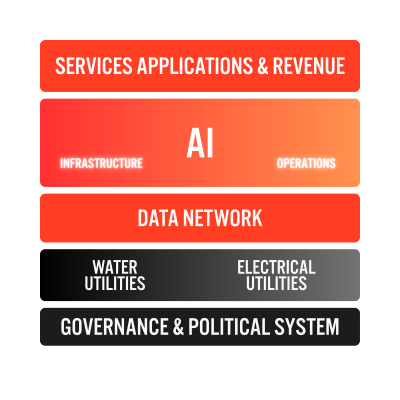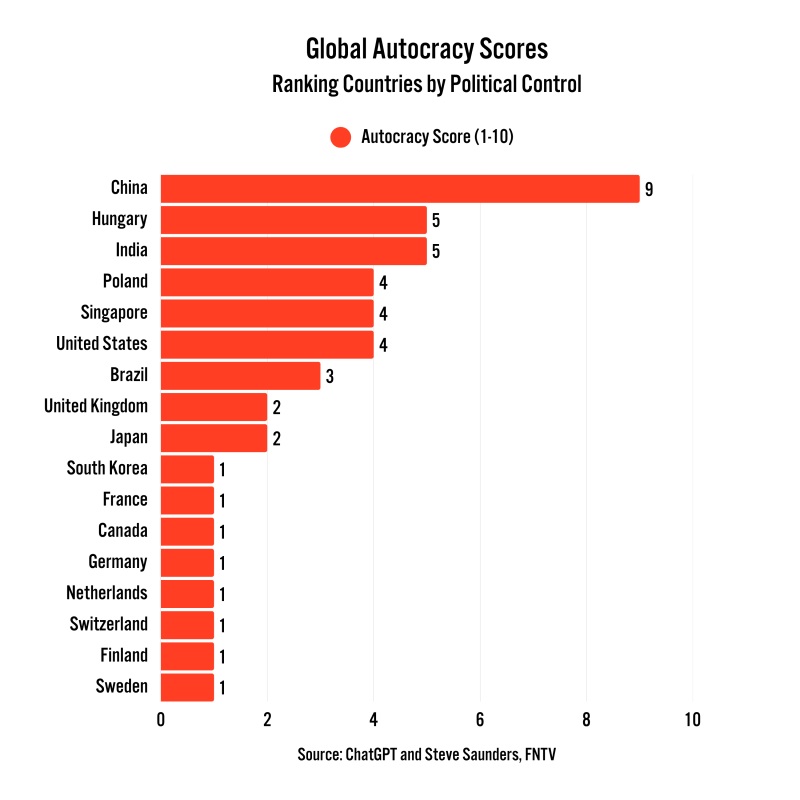- Building an AI economy requires more than just GPUs and networks
- China launched its AI strategy in 2006. America’s plan arrived yesterday
- Political structures are the fundamental barrier to U.S. AI leadership
Building a true AI economy isn't just about GPUs and networks, it's about political will and decision-making. Here, the U.S. is notably behind the rest of the world, hindered by a political system ill-equipped for the task.
Regular readers are aware that I've been exploring the emerging global AI economy and what is required to support its growth. This led me to formulate the Infradig Four-Layer AI Stack. My model differs from those of analyst firms and consultancies in that it’s holistic, looking beyond technology and its business implications to encompass all the elements needed to power a worldwide economic revolution based on artificial intelligence, including utilities like power and water.
The Infradig five-layer AI stack. You’re welcome.
But recently, I realized that I’d missed the most critical layer of all — politics. (See the new Infradig five-layer AI stack image, below).

In the Infradig model, the AI layer is supported by a new type of data network, the intelligent area network (meet IAN). Underneath the IAN are the essential utilities: water for cooling and electricity for power (for health and safety reasons, I recommend keeping these separate when building out your own world-leading AI economy.) Beneath all, enabling all, or just getting in the way: foundational politics.
It’s clear that without an effective political apparatus in place, individual nations cannot build competitive AI infrastructure.
With one exception, the political systems most adept at undertaking this task are autocracies (and democracies that exhibit totalitarian traits). Below is a list of the 17 countries around the world that are at the forefront of building AI economies, ranked by their level of absolutism. (Note: I used ChatGPT to provide the numbers. Disagree with the ratings? Talk to the bot).
Global autocracy scores: Ranking countries by political control
It’s no coincidence that the top five most autocratic countries — China, Hungary, India, Poland and Singapore — are also moving fastest to architect and deploy full-stack AI infrastructure. These governments have already integrated AI into manufacturing, automotive and healthcare sectors; provided strategic funding to companies and research institutions; and launched initiatives to foster a thriving digital ecosystem.

They’ve achieved this in large part because autocracies excel at rapid decision-making and resource mobilizatio — traits essential for pioneering AI infrastructure.
No fuss, no muss; no delays, no debate. When an autocrat commands 'Jump,' their country asks, 'How high?'
That approach contrasts wildly with how the U.S., which places sixth in the strongman ranking.
The U.S. sits at the crossroads of extreme wealth, autocratic tendencies and a dominant Big Tech-fuelled AI industry. On paper, it should be the leader in the AI stack contest. But in reality, its data infrastructure is mediocre, and thanks to a decision to abandon federal infrastructure investments in the 1970s, it’s burdened with some of the weakest grid and water systems of any developed nation.
It’s also the only country on the list that hasn’t had a centralized, government-led, taxpayer-funded strategy for building a comprehensive AI economy.
That is, until yesterday, when President Trump unveiled his AI Action Plan.
The good news is that President Trump’s strategy emphasizes improvements to the nation's energy and water infrastructure. The bad news is that it’s about 20 years too late (China has included AI infrastructure measures in four of its five-year plans, starting in 2006). But also, it’s being deployed on top of a political system that is utterly incapable of implementing its goals.
The U.S. governance framework, built on a decentralized, checks-and-balances approach, inherently hampers rapid decision-making and large-scale infrastructure investments (the BEAD initiative has set the gold standard for this kind of failure to execute).
Deep political polarization, combined with a relentless cycle of lobbying, bullying, partisan bickering and a pervasive short-term focus, also prevents the implementation of long-term, strategic policies to reimagine and reconstruct foundational utilities like water and power, essential for building a resilient AI infrastructure.
Further, the well-funded influence of powerful industry and state interests, as well as social media-driven populism, undermines consensus on necessary investments, leaving any ambitious AI plan vulnerable to paralysis.
Essentially, today’s U.S. combines the downside of unattractive antidemocratic traits that are accelerating AI economies in other parts of the world, but without any of the industrial and commercial benefits that accrue from totalitarian rule. And that’s creating a vulnerability (an AIchilles heel, if you will) that left unaddressed, will capsize not just U.S. leadership in AI, but its entire economy.
Am I advocating for the U.S. to shift toward full-scale autocracy to build an AI infrastructure fit for purpose? (Less mouse clicks, more heel clicks, so to speak).
No — and the Big Tech plutocrats wouldn’t permit such a thing anyway.
A more strategic approach — emulating leadership figures such as Roosevelt, Otto von Bismarck, Saladin, and my personal favorite, Charles de Gaulle — could steer the U.S. toward sustainable AI leadership.
I don’t see that happening. In fact, under this administration, we appear destined to indefinitely endure the petty politicking that dominates Congress (and Parliament and the European Council).
America’s AI problem is a political problem. In a landscape where everything is personal and governance has failed, don’t hold your breath for meaningful policy — just a hubristic parade of vested interests and AI delusions, and the further deterioration of the American dream.
For more analysis of the AI economy, click and subscribe here.
Steve Saunders is a British-born communications analyst, investor and digital media entrepreneur with a career spanning decades.
Op-eds from industry experts, analysts or our editorial staff are opinion pieces that do not represent the opinions of Fierce Network.